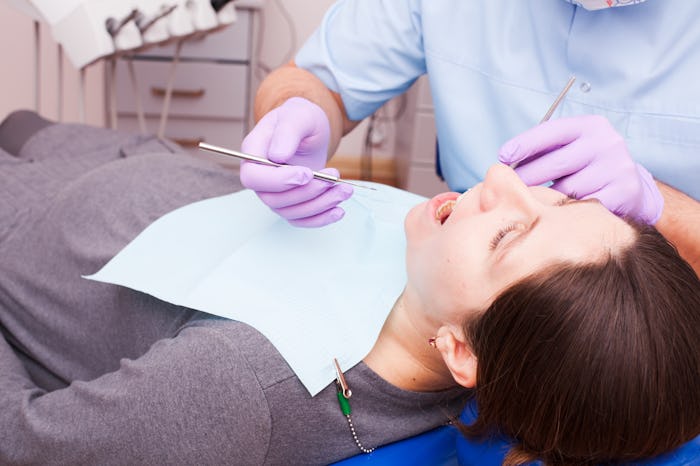Life

Here's What You Need To Know About Getting A Deep Dental Cleaning During Pregnancy
While interviewing experts for this article, there were quite a few dentists who mentioned the saying, “Have a baby, lose a tooth.” Because apparently, oral issues are extremely common among pregnant women. This is why it’s so important to regularly see your dentist for your scheduled cleanings during your pregnancy. But what about if you need extra help? Can you get a deep dental cleaning during pregnancy?
According to many experts, it is safe to get your teeth deep cleaned — and getting it done is especially important if you’re diagnosed with periodontal disease — as long as you clear it with your OB-GYN first. Dr. Steven Golubow, a dentist and owner of Zebulon Dental Center, says to get the procedure done between 13 and 21 weeks, since “periodontal disease has been linked with preterm labor and low birth weight." He tells Romper that there used to be "some concern over using dental anesthetic, because it has been shown to cross the placental barrier, but a study in The Journal of the American Dental Association found that women who are 13 to 21 weeks pregnant can safely have essential dental treatment that involves topical and local anesthetics."
So why a deep cleaning instead of a regular cleaning? Dr. Samantha Sacchetti, a dentist at Village Dental in Chicago, tells Romper that while both types of cleanings get rid of any plaque, bacteria, and infected parts of your gums, a deep cleaning is different, as it goes further below your gums than a typical cleaning. “The roots of the teeth are also smoothed to prevent plaque and bacteria from adhering to the surface and causing further bone loss." She says most patients will receive local anesthetic because it's a bit uncomfortable and "some patients will also receive local or systemic antibiotics to help control the levels of bacteria."
And to that end, some experts disagree that it’s 100 percent safe because of said bacteria — like Dr. Alireza Panahpour, a systemic, biological, and holistic dentist and author of The Good Dentist. He tells Romper, “Deep cleaning involves removing biofilm on teeth — and that is not recommended for pregnant women unless their medical doctor or naturopath recommends it for the health of the mother.” Panahpour says it’s because the deep cleaning will spread this biofilm into the rest of her body, “including the unborn child. Everything introduced into the mother's body will also affect her unborn child, including the bacteria found in the biofilm that causes dental decay and infection. It is for this same reason that other dental procedures are not recommended during pregnancy, if possible.” He suggests clearing any dental procedures with your OB-GYN first.
Dr. Chris Kammer, dentist founding father of the American Academy for Oral Systemic Health, and Spry expert says there's so much oral bacteria during this procedure it could create a "bacteriological storm" in the body, giving it easy access to the bloodstream. Kammer also tells Romper it's a good idea to have your mouth tested for high-risk oral pathogens to determine the levels of periodontal bacteria before having the deep cleaning procedure done.
So why do pregnant women have all of these issues with their oral health anyway? Dr. Neil Hadaegh, a dentist of NH Dentistry Beverly Hills, tells Romper it’s because “the hormonal changes lead to an exaggerated response to plaque build up, causing gum tissue to become inflamed, tender, bright red, and bleed easily.” This is gingivitis. Hadaegh recommends brushing your teeth at least twice a day, “preferably with an electric toothbrush for two minutes, and flossing at least twice a day,” to have optimal dental health while pregnant. Kammer adds, "Daily exposures to xylitol will reduce the levels of cavity-causing bacteria and make it harder for plaque to form. Also a daily oral probiotic feeds the good bacteria in the mouth, which helps starve out the bad bacteria."
If you don’t have gingivitis or periodontal disease, it looks like regular cleanings are just fine, and highly recommended, if you’re pregnant. As for deep cleanings, it’s up to you, your dentist, and OB-GYN. Every person’s situation is different, and sometimes, the severity of the disease outweighs the risks of having the deep cleaning procedure done. Just make sure you do it between 13 and 21 weeks. Happy flossing.
Check out Romper's new video series, Bearing The Motherload, where disagreeing parents from different sides of an issue sit down with a mediator and talk about how to support (and not judge) each other’s parenting perspectives. New episodes air Mondays on Facebook.